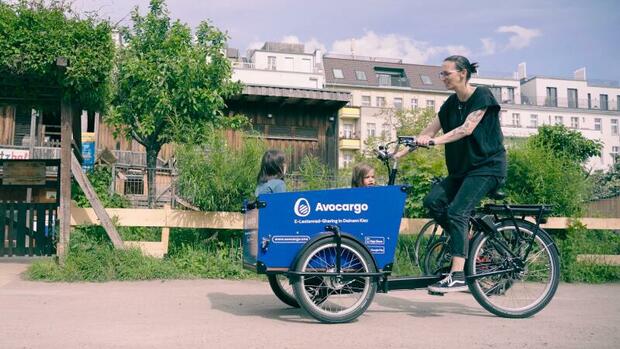The cargo bike provider failed when trying to raise fresh money.
(Photo: Avocargo)
Berlin The energy start-up Efficient Energy tried unsuccessfully, as did the food delivery service Alpakas and the cargo bike provider Avocargo: They negotiated with various venture capitalists about urgently needed cash injections – and failed.
The examples show how much more difficult it has become for start-ups to raise capital this year. Investors from the USA, who are hardly ever involved in Europe, amplify the effect. In the first half of the year, the participation of US funds in deals fell by almost 70 percent. This is shown by current figures from the data service Pitchbook from Thursday.
The experts attribute this development, among other things, to the uncertainties about future interest rate policy in Europe, the reduced appetite for cross-border deals and the consequences of the collapse of the Silicon Valley Bank. Venture capitalists such as Sequoia, Founders Fund and Andreessen Horowitz currently prefer to take care of their US portfolio.
Investments in German start-ups fall by more than half
Hedge funds and sovereign wealth funds also invested significantly less in start-ups than they did a year ago. Many need to balance their holdings to reflect falls in stock markets. Investment banks and the investment divisions of corporations were also cautious.
This reservation has a clear impact on Germany: According to the Pitchbook, start-ups in this country only received 3.7 billion euros in the first half of the year. That is less than half of what flowed in the same period last year, and less than in 2020.
The Dutch e-bike manufacturer had to file for bankruptcy this week – even though it had already collected 190 million euros from investors.
(Photo: VANMOOF via REUTERS)
However, the young German companies fared somewhat better than the European average. Investments here fell by almost 61 percent to 8.9 billion euros. A similar development was made by the management consultancy EY a few days ago.
The experts at Pitchbook attribute the minus to persistently high inflation rates, rising interest rates, a lack of IPOs and the very difficult financing conditions for the venture capital funds themselves. Analyst Navina Rajan is therefore not sure whether Germany has already bottomed out: “We have to wait and see whether the bottom has been passed and whether we will see a significant recovery in the second half of the year.”
The reluctance of investors means that more and more start-ups are struggling to survive. When lenders start investing more again is likely to depend heavily on when the stock markets revive and open up for IPOs. This is already foreseeable in the USA.
Companies have to accept devaluations
In the meantime, significantly more start-ups are willing to accept devaluations in return for new funds. An example of this is the fast food delivery service Flink, whose company value fell from three to one billion euros in a financing round in May. The fintech giant Klarna also had to accept a significantly lower valuation.
The decline in investments was also reflected in the fact that there were fewer rounds of financing. From April to June, 207 deals took place in Germany, compared to 334 in the second quarter of 2022. According to the Pitchbook, there was a trend towards somewhat larger financing rounds. While rounds of financing between 10 and 25 million euros collapsed by almost 40 percent across Europe, the minus for deals between 500,000 euros and one million euros was 64 percent.
Investors generally expect larger injections of money that the sum made available will then last longer and that the young company may also be in the black, making it independent of venture capital. That should also be the plan of the Munich charging infrastructure start-up ChargeX, which recently received 11.5 million euros from investors.
>>Read more about this here: Insolvencies could reach a new record high
However, there was a lack of capital injections of more than 100 million euros, which were even more frequent in the corona crisis. Two of the larger exceptions came from France: More than 400 million euros went to the crypto start-up Ledger, the mealworm company Ynsect received around 160 million euros.
According to EY, there were still 15 deals worth more than 100 million euros in the first half of 2022. A year later, only five investments of this dimension were counted.
AI startups can be confident
Nevertheless, there is at least one ray of hope: artificial intelligence. Pitchbook predicts that there will likely be significantly more financing rounds for start-ups in this area in the coming quarters. There were already a few deals in the first half of the year.
The French start-up Mistral, which wants to develop language models for industries and collected more than 100 million euros shortly after it was founded, made the headlines. The German competitor Nyonic also wants to go public with a round of financing soon.
>>Read also: AI boom: Despite the financing crisis, more start-ups are being founded again
In view of the trend topic and business model alone, Nyonic should have significantly better chances than Efficient Energy, Alpakas and Avocargo, all of which had to file for bankruptcy after the negotiations failed. The situation was similar this week for the e-bike manufacturer Vanmoof from the Netherlands, which had previously received almost 190 million dollars from international investors.
More: 105 million euros for little more than an idea
